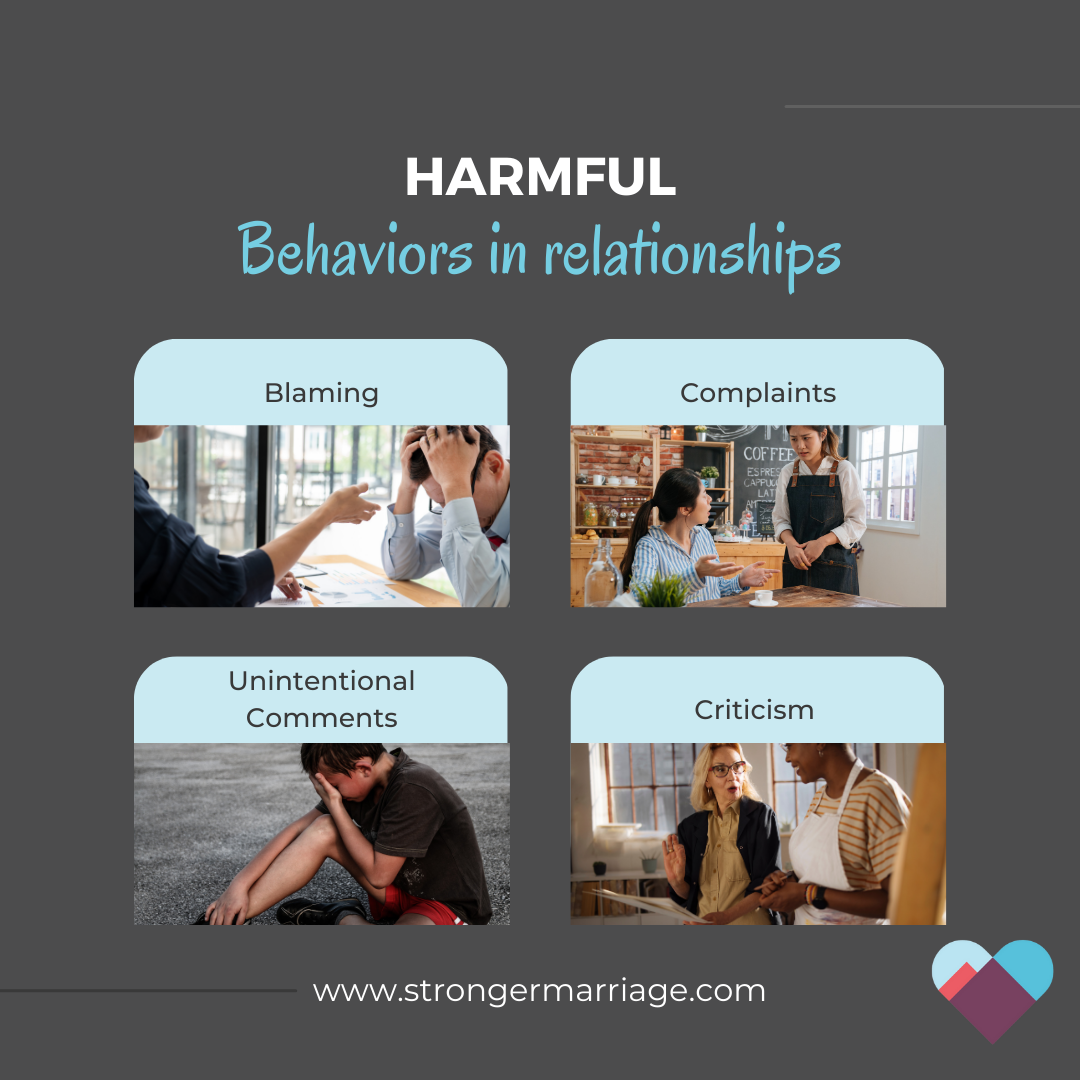
Harmful Behaviors in Your Relationship
If you’ve ever been in a relationship before, you know they can be difficult at times. Although they are not a walk in the park, there are ways that we can improve relationships and the part we play. Relationships are two-sided, and both sides play a part in the dynamic of how well a relationship functions. While it can be easy to blame the other partner, looking at your own behaviors can be a more effective approach. In this post, there are four different behaviors you can change and alternatives that can lead to a healthier relationship.
Blaming
Blaming your partner can be detrimental when addressing issues within the relationship. When you blame your significant other, it can lead to both partners feeling anger and resentment towards each other. This can cause even more unnecessary conflict. Blaming from both sides puts each other in a defensive position. Neither one wants to admit they are wrong. So, instead of immediately blaming your significant other, take a step back and look at the role you play. What are things you can control? What can you change about the situation? By reflecting on your own role, you might be able to see a different perspective that can lead to the issue being resolved in a calmer manner. This practice is known as humility.
Complaints
Complaining is when you show dissatisfaction or annoyance towards your significant other about something they may or may not have done. In a relationship, this could look like complaining about your spouse not doing their dishes or taking the trash out. Complaints usually come from small irritations you notice in your relationship daily. This type of behavior can be unhealthy for your relationship as you are constantly nitpicking at your partner. It can start to irritate them and cause more tension.
Instead of complaining, choose to make requests. Most irritants we feel tend to be small things that can be ignored. In the instance something does need to be discussed, don’t complain about it. Take the time to communicate with your partner and make requests. For example, instead of saying something along the lines of “You never take out the trash when it is full,” say “I was wondering if you would be able to take the trash out when it gets full. I’ve noticed it has been overflowing a lot more lately and would love for it to be taken out before that happens.” By making requests, not complaints, you and your partner will be able to communicate these issues in a civil manner.
Unintentional Comments
When addressing behaviors to change in a relationship, being intentional can be a big difference between a healthy and unhealthy relationship. Being intentional means doing something with a purpose. Throughout marriage and relationships in general, bids will be made from one partner or the other. A bid is when you or your partner does something to get the attention of the other person. Bids can come in the form of both nonverbal and verbal behaviors. An example of a nonverbal bid would be sighing, smiling, or winking. A verbal bid can be shown through a partner saying, “You wouldn’t believe what happened to me today.” Bids are made all the time in relationships. The important part is how you respond to them.
Making comments that are not intentional in response to your partner's bid can be detrimental to your relationship. Making comments that don’t mean anything or not responding to the bids can be seen by your partner as hurtful. It shows you don’t care about them and what they have to say. Instead of responding with, “Stop sighing so loud,” you can say “What going on? Are you okay?” The difference in response can demonstrate to your partner that you sincerely care about them and what they have to say about their day. When responding to what they are saying, be intentional. Don’t make comments you don’t mean. Making intentional comments can increase your connection within the relationship. This can lead to a happier and healthier marriage.
Criticism
Similar to unintentional comments, criticism is another behavior that can be detrimental to your relationship. Criticism is constantly pointing out negative traits or aspects about your partner. Only pointing out the negative traits may make it, so your partner no longer enjoys being around you. Imagine how it would feel if every time someone talked to you, they were only pointing out your flaws. Most people would say they would never want to be around this person. Criticism targets your partner's character and can be hurtful to them. If you are constantly pointing toward their flaws, they may start to do the same thing to you, creating unneeded tension in your relationship.
Instead of criticizing your partner, practice pointing out positive qualities in your partner. Change your inner voice to think more positively. This can benefit you, your partner, and your relationship. Your communication regarding your partner and any situations you are in together will be communicated in a gentler manner.

